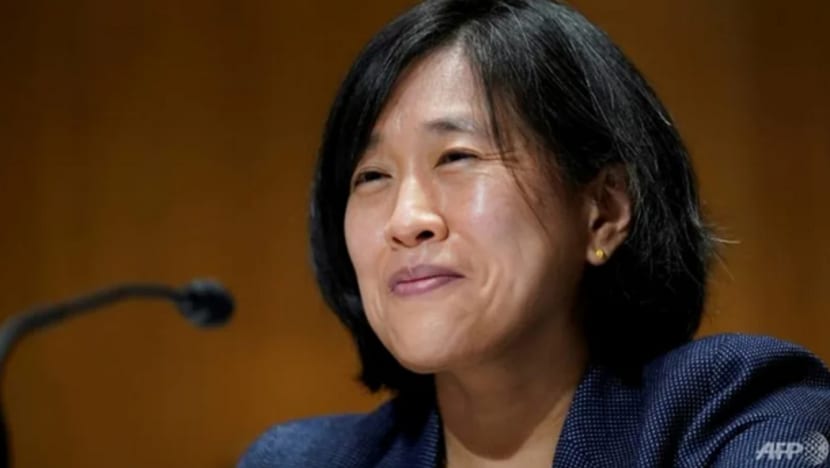‘Profoundly consequential’ relationship between US and China needs to be responsibly managed: US trade chief
The Xi-Biden meeting sends a powerful signal that the two leaders are able to manage their complicated relationship, said US Trade Representative Katherine Tai.

United States Trade Representative (USTR) Katherine Tai. (File photo: AFP/Susan Walsh)
SINGAPORE: The relationship between the United States and China is “profoundly consequential”, and needs to be managed responsibly, said US Trade Representative (USTR) Katherine Tai, a day after a meeting between the countries’ leaders.
While differences remain, US President Joe Biden and Chinese President Xi Jinping have tasked their senior officials to build on engagement and communication with “open and candid conversations”, Ms Tai said on Tuesday (Nov 15).
“The economic relationship between the US and China remains profoundly consequential, but also complex,” she told CNA from the sidelines of the Bloomberg New Economy Forum in Singapore.
She added: “The issues are not easy, but the responsible management of this relationship is absolutely critical.”
XI-BIDEN MEETING SPURS HOPES FOR MORE DIPLOMACY
On Monday, the two presidents met on the sidelines of the G20 Summit, marking their first in-person dialogue since Mr Biden took office. The outcome of the discussion was met with optimism by observers and markets.
Ms Tai said the meeting sends a powerful signal that both leaders are able to manage their complicated ties.
She said she hopes for more face-to-face engagements between delegates from US, China and Asia, as countries ease restrictions and transit towards normalcy following the pandemic.
“The impacts of the COVID years on the entire global economy can't be understated,” she said. “Nothing substitutes for in-person interactions. The basis of our interactions are the relationships that we build, even when the larger bilateral relationship remains extremely complicated.”
TARIFFS, FOOD SECURITY
However, warming ties will not see the US lifting tariffs that former president Donald Trump had earlier placed on Chinese imports.
Ms Tai said that as her country continues to look for realignment in the US-China trade relationship, the tariffs can be a strategic tool.
“President Biden raised with President Xi ongoing US concerns about the negative impacts of China's non-market economic practices on the US economy, on our workers, families and businesses, and those impacts around the world as well,” she said.
Despite challenges, food security is a shared goal that transcends differences between nations, Ms Tai noted.
“There’s certain transnational challenges that the US and China must work together on, and global food security is one of them,” she said.
“It’s frankly an issue that we need to work with all partners and countries on … with Ukraine, with Europe, with the World Trade Organization, to focus on keeping food trade moving around the world.”
ECONOMIC ENGAGEMENT WITH ASIA
Ms Tai also emphasised on the need for strengthened economic cooperation between the US and Asia.
She cited several factors in recent years leading to challenges in the current economic landscape, including pandemic-associated disruptions to supply chains, Russia's invasion of Ukraine that further put pressure on food and energy supplies, the urgency of the climate crisis, and the digital transformation of economies.
These contributed to the formation of the Indo-Pacific Economic Framework (IPEF) to boost economic engagement between the US and the region, said Ms Tai.
“This creates the need and opportunity for us to work together and explore new ways that we can bring our trade tools to bear in service of resilience, sustainability, and inclusion,” she said.
The IPEF, an economic initiative launched by Mr Biden in May, has 14 member states including Singapore, Malaysia, Japan, and Australia.
Ms Tai said that a “tremendous amount” of momentum has since been generated, and the US is “extremely bullish on this economic framework as we head into 2023”.














